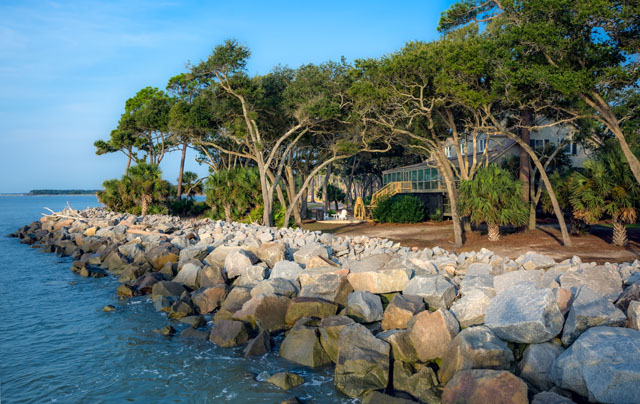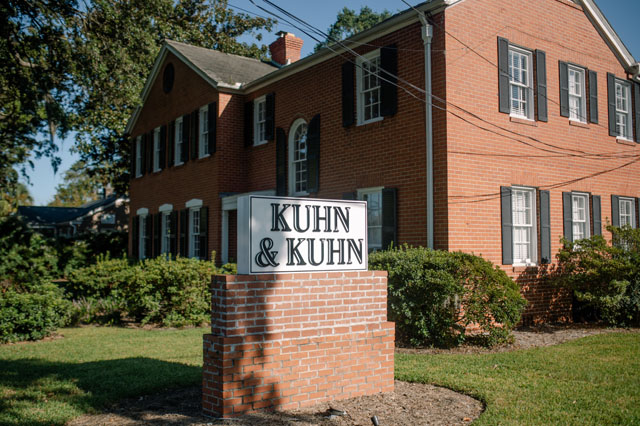You Say “Summerville,” I Say “Football!”
03 Sep 2025
Three cheers for the winningest coach ever
September-october 2025
Written By: By TIM LOWRY | Images: Photos courtesy of Dorchester District Two
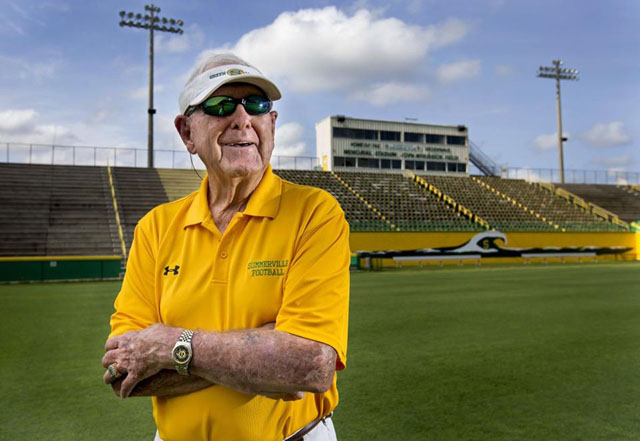
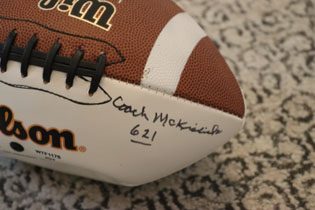
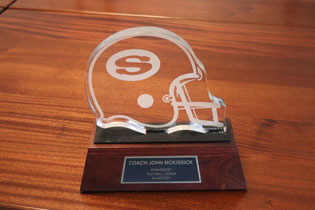
When the calendar turns from August into September, we people of the South Carolina Lowcountry, are fully aware that relief from summer discomforts are still months away. It will still be hot, mosquitoes will still swarm, and the humidity will continue to lay upon us like a wet blanket. However, these oppressive realities are mere inconveniences to the local citizenry. In the autumn of the year, to use a biblical phrase, the lines will nonetheless fall in pleasant places.
“What lines?” you may ask. The lines on the old grid iron of McKissick Memorial Stadium in Summerville, South Carolina, because it’s football season, of course! The story of the stadium’s namesake, some people will argue, is the story of the town itself.
John McKissick was born in Greenwood, South Carolina, on September 25, 1926. His family moved to Kingstree when he was about 10 years old. It was there that he played Pee Wee Football, called Midget Football in those days. It was love at first hike. Years later, John recalled that his father wanted him to quit the game, get a job and earn money, but his mother recognized his great passion for sports and convinced her husband to let him play.
She had good instincts. John went on to distinguish himself on the high school team and then tried out for a sports scholarship to Clemson University. However, just five days after starting in the college program, he was drafted into the armed forces. John trained as a paratrooper, expecting to be part of the invasion of Japan with the 82nd Airborne, but the atomic bomb brought a quick end to the war allowing McKissick to remain stateside and continue his college career. Instead of returning to Clemson, he attended Presbyterian College, and eventually earned a degree in economics. However, football would be the only career John McKissick would ever pursue.
In July 1952, just one month after his marriage to his wife Joan, John was hired as head football coach of the Green Wave at Summerville High School. At that time, Summerville was a quiet little village with dirt streets, not particularly different from neighboring towns of similar size. However, that was about to change because Coach McKissick was at the forefront of a run that would be unequalled in the annals of football history.
His great success was probably due to two factors. First, he was quoted as saying, “We never went into a game that we didn’t think we could win. And if you think you can, a lot of times you can.” Second, his wife claimed that he was highly motivated to win because he really wanted to keep his job!
With quiet confidence, Coach McKissick began winning game after game. In his third year, he won his first state championship, and then another the very next season. Over the next six decades, the Summerville Green Wave won a total of ten state championships. Between 1978 and 1980, McKissick’s team won 41 consecutive games, the longest winning streak in South Carolina. In 2012, Coach McKissick’s players carried him off the field as they celebrated his 600th win. By the end of his career, he had tallied 621 wins to become the undisputed winningest coach at any level in the history of American football.
He was inducted into both the South Carolina Athletic Hall of Fame and the National High School Sports Hall of Fame, was twice honored as National High School Football Coach of the Year and received commendations from four different U.S. presidents.
Many of his players went on to distinguished college careers and several played for the NFL. However, when Coach McKissick spoke about his players, he more often mentioned the pride he took in seeing teenage boys mature into industrious and successful auto mechanics, business owners, lawyers and doctors working in the Summerville community.
McKissick’s dedication to his players crossed all barriers. One former player recalled the days of racially segregated high schools saying, “John McKissick was always at the Alston High School games. (Alston High School was the dedicated school for African American students.) He knew that the schools would eventually be integrated, and he was just waiting to incorporate black talent into his team. Race wasn’t an issue.”
It has been noted that he never cut a kid who tried out for his team. If they were dedicated to the sport, then Coach McKissick was dedicated to them. That meant he never missed a game, not even one, his entire career. He even coached a game the day after his own father died. It was not out of disrespect, but a lifelong commitment to his community. Other schools and universities tried to lure him away, but he stuck with Summerville until his retirement in 2015 after 62 seasons. And Summerville has stuck with him.
For many years, a special section of the town museum was dedicated to his legacy. After Coach McKissick’s death in 2019, at the age of 93, the museum underwent a renovation. The collection was expanded and
moved to a dedicated facility that sits adjacent to the football stadium in downtown Summerville where Coach McKissick spent countless hours investing his life into the life of the town. It opened in 2023.
Opening 90 minutes before every home game, the museum displays vintage jerseys, portraiture, championship game balls, playbooks, yearbooks and plenty of trophies. There is also an interactive touch screen, reproducing every page of Joan McKissick’s scrapbook that chronicles every year of her beloved husband’s entire career. People come from all over the country to learn about Coach McKissick, reminisce about their years as a Summerville Green Wave, and pay homage to the man who loved football, loved his players and loved his town.

